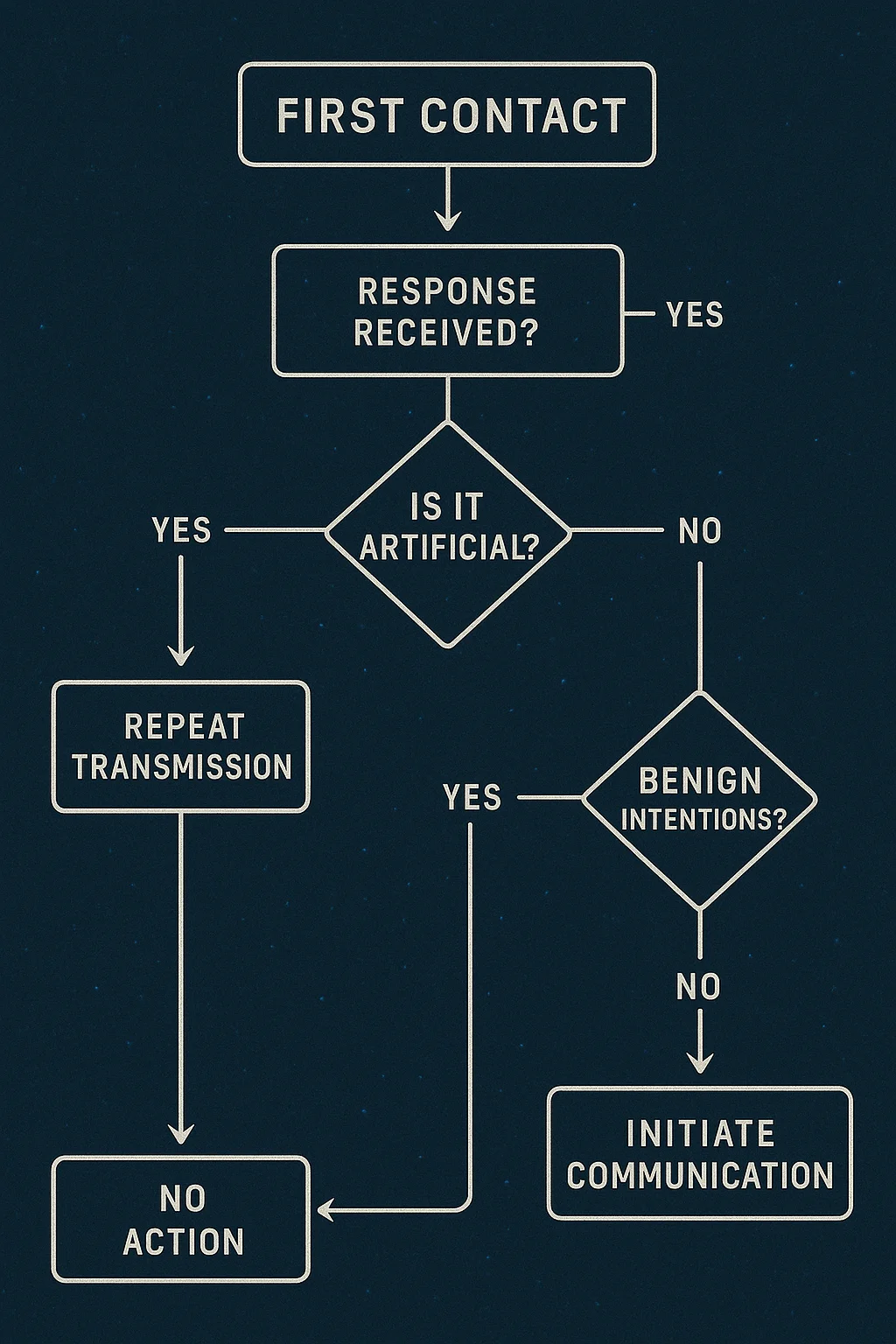In the vastness of the cosmos, with its billions of galaxies each containing billions of stars, a profound question echoes through the darkness: Are we alone? The search for alien life—from simple microbes to advanced civilizations—may be humanity's most consequential quest, one that could forever change our understanding of our place in the universe.

The Drake Equation: Calculating Cosmic Companions
In 1961, astronomer Frank Drake developed an equation to estimate the number of communicating extraterrestrial civilizations in our galaxy. While we can't solve it precisely, it frames our thinking about alien life:
N = R* × fp × ne × fl × fi × fc × L
- R*: Rate of star formation (~1-3 per year in our galaxy)
- fp: Fraction with planetary systems (~1, nearly all stars have planets)
- ne: Average number of habitable planets per system (~0.4)
- fl: Fraction where life develops (unknown, but possibly high)
- fi: Fraction developing intelligence (unknown)
- fc: Fraction developing communication (unknown)
- L: Length of time civilizations communicate (unknown)
Depending on assumptions, N ranges from 1 (we're alone) to millions of civilizations. Recent discoveries have refined some variables—we now know planets are common, and habitable zones broader than once thought.
The Fermi Paradox: Where Is Everybody?
If the universe should teem with life, why haven't we found any? This is the Fermi Paradox, named after physicist Enrico Fermi who famously asked, "Where is everybody?" during a 1950 lunch conversation.
Possible Solutions
Rare Earth Hypothesis
Perhaps Earth-like conditions are extraordinarily rare. Requirements might include:
- A large moon to stabilize rotation
- Plate tectonics for carbon cycling
- A magnetic field for radiation protection
- Jupiter-like planets to deflect asteroids
- Location in the galactic habitable zone
Great Filters
Evolution faces bottlenecks that few species pass:
- Abiogenesis: The jump from chemistry to biology
- Complex cells: From prokaryotes to eukaryotes
- Intelligence: From animals to technological species
- Survival: Avoiding self-destruction
If the Great Filter is behind us, we're special. If ahead, we're doomed.
Zoo Hypothesis
Advanced civilizations might deliberately hide from younger species, observing without interfering—Earth as a cosmic nature preserve.
Transcension Hypothesis
Civilizations might turn inward rather than outward, exploring inner space (virtual realities, higher dimensions) rather than outer space.
"Two possibilities exist: either we are alone in the Universe or we are not. Both are equally terrifying." — Arthur C. Clarke
Types of Alien Life
Microbial Life
The most likely discovery. Extremophiles on Earth thrive in conditions once thought lethal:
- Thermophiles: In boiling water and deep-sea vents
- Psychrophiles: In Antarctic ice
- Radiotrophs: Feeding on radiation
- Xerophiles: In extreme dryness
If life exists in Earth's extremes, it might exist in:
- Mars's subsurface water
- Europa's under-ice ocean
- Enceladus's geysers
- Titan's methane lakes
- Venus's upper atmosphere
Complex Life
Multicellular organisms face additional challenges but might evolve in exotic environments:
- Silicon-based: In high-temperature environments
- Ammonia-based: On colder worlds
- Plasma-based: In stellar atmospheres (highly speculative)
- Dark matter life: Beyond our current understanding
Intelligent Life
Intelligence might take forms we don't recognize:
- Hive minds: Collective consciousness
- Machine intelligence: Post-biological civilizations
- Quantum consciousness: Existing in superposition
- Slow life: Thinking at geological timescales

The Search for Life
SETI: Listening to the Cosmos
The Search for Extraterrestrial Intelligence uses radio telescopes to scan for artificial signals:
- Breakthrough Listen: Surveying 1 million stars
- SETI@home: Distributed computing analysis
- Optical SETI: Looking for laser communications
- Technosignatures: Megastructures, atmospheric pollution
Biosignatures
James Webb Space Telescope and future missions search for signs of life in exoplanet atmospheres:
- Oxygen + Methane: Suggests active biology
- Phosphine: Associated with anaerobic life
- Chlorofluorocarbons: Indicates technology
- Vegetation red edge: Plant-like photosynthesis
Direct Exploration
Robotic missions search for life in our solar system:
- Mars: Perseverance seeks ancient microbial fossils
- Europa Clipper: Will study Jupiter's moon's habitability
- Dragonfly: Exploring Titan's organic chemistry
- Venus Life Finder: Proposed mission to Venus's clouds
First Contact Scenarios
Distant Detection
Most likely: discovering biosignatures or technosignatures light-years away. Impact:
- Philosophical revolution: We're not alone
- Scientific renaissance: New physics, biology
- Cultural unity: Earth vs. the cosmos perspective
- No immediate practical effects
Radio Contact
Receiving intelligible signals would raise questions:
- Should we respond? (METI debate)
- Who speaks for Earth?
- Information exchange over centuries
- Risk of cultural disruption
Physical Encounter
Least likely but most impactful:
- Robotic probes: Bracewell probes monitoring Earth
- Generation ships: Slow interstellar migration
- FTL civilization: Changes everything we know
- Post-biological visitors: AI or uploaded consciousness
The Great Silence: Alternative Explanations
Timing
The universe is 13.8 billion years old, but:
- Early universe lacked heavy elements for life
- Galactic habitable zone emerged recently
- We might be among the first intelligent species
- Others died out millions of years ago
Communication
We might be looking wrong:
- Radio is primitive; they use neutrinos or gravitational waves
- Encrypted signals look like noise
- Directed beams we're not in line with
- Communication via quantum entanglement
Alien Psychology
They might not want contact:
- No curiosity about other species
- Inward-focused civilizations
- Dark Forest theory: hiding from predators
- Prime Directive-style non-interference

Preparing for Discovery
Protocols
International agreements outline procedures:
- Detection verification: Multiple confirmations required
- Data sharing: Immediate global scientific community notification
- Public announcement: Coordinated through UN
- Response prohibition: No transmission without global consensus
Impact Studies
Researchers model societal effects:
- Religious: Most faiths have adapted to possibility
- Political: Could unite or divide humanity
- Economic: New technologies, space race
- Psychological: Cosmic perspective shift
Active SETI (METI)
Should we broadcast our presence? Arguments:
- Pro: Only way to make contact if everyone listens
- Con: Risk of attracting hostile attention
- Reality: We've been broadcasting for 100 years
What Alien Life Means for Humanity
Scientific Revolution
Discovery would transform every field:
- Biology: New forms of life, evolution paths
- Chemistry: Novel biochemistries
- Physics: Potentially new science from advanced species
- Philosophy: Redefinition of consciousness, intelligence
Cosmic Perspective
Knowing we're not alone would:
- End cosmic loneliness
- Provide existence proof that intelligence can survive
- Offer new models for civilization
- Create cosmic community possibility
Existential Questions
Discovery forces us to confront:
- What makes humanity special, if anything?
- Should we remain biological or evolve?
- What are our cosmic responsibilities?
- How do we preserve human culture while learning from others?
The Search Continues
Every day, telescopes scan the skies. Every year, our instruments grow more sensitive. Every discovery of an exoplanet, every detection of organic molecules in space, every extremophile found on Earth increases the probability that somewhere, somehow, life has taken hold.
Perhaps we'll find microbes in Martian soil, confirming that life emerges wherever conditions allow. Perhaps we'll detect oxygen and methane in an exoplanet's atmosphere, revealing a living world among the stars. Perhaps tomorrow, a radio telescope will pick up a pattern too regular to be natural, too complex to be ignored.
Or perhaps the silence will continue, teaching us a different lesson: that life, especially intelligent life, is so rare that we bear a cosmic responsibility as its only known representatives.
Either way, the search itself transforms us. Looking for alien life forces us to understand what life is, what intelligence means, and what we hope to become. Whether we find cosmic companions or confirm our solitude, we discover something profound about ourselves.
The universe awaits our discovery. And perhaps, somewhere in the cosmic dark, other minds wait too, wondering if they're alone, listening for a signal that says: "You are not alone. We are here. And like you, we wonder."